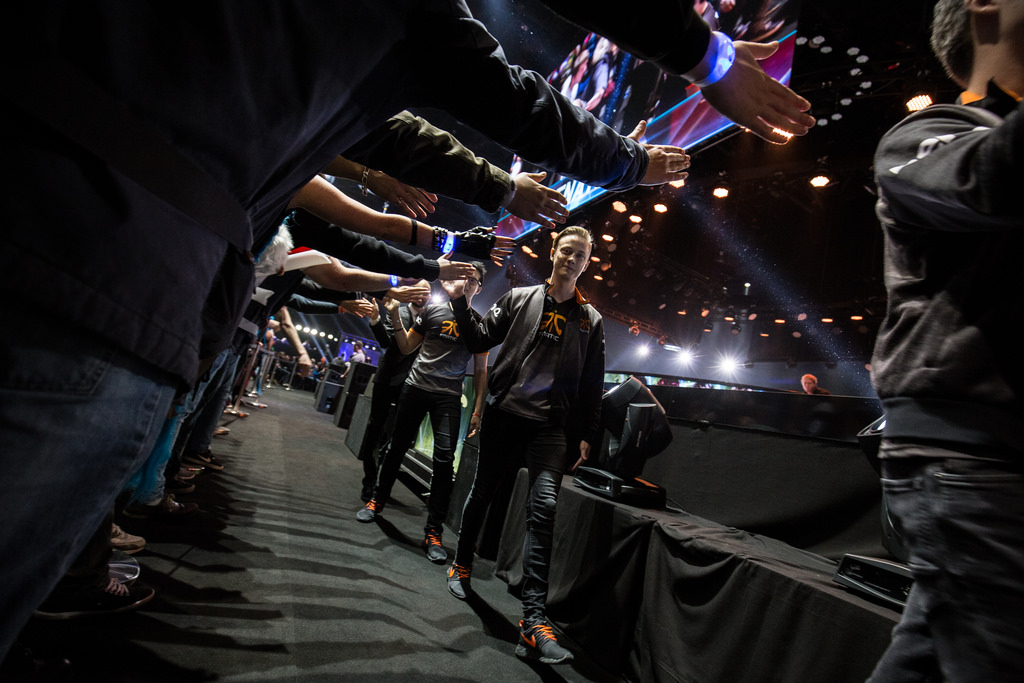Some of the most shocking news of an eventful League of Legends offseason hit today as the best Western team lost two of its key players, leaving fans scrambling for answers.
After back-to-back League Championship Series (LCS) titles and a top-four finish at the Riot World Championships, Fnatic is losing top lane star Heo “Huni” Seung-hoon and jungler Kim “Reignover” Eu-jin. That’s left many fans of the players and the team questioning just what happened. Why would two strong players leave a team like Fnatic, one who looked like a contender for titles on the World stage? Why couldn’t Fnatic keep their star players?
Fnatic AD carry Martin “Rekkles” Larsson, who knows something about being a free agent in League of Legends and the type of vitriol directed at free agents who swap teams (considering he left Fnatic for Alliance before the 2015 season), took a pragmatic approach to answering those questions as he addressed fans on his stream after the announcement.
“I’ve already spoken to both of them individually and I would have made the same choice if I were them,” Larsson said.
“The problem is, what people don’t understand yet, is that Europe is super far behind in terms of money,” he explained. European teams offer “three times less than the salary paid out in NA or Korea,” he continued (though later clarified that it’s perhaps only “two times”). “Therefore keeping players is just hard in general, you know?”
Everything that’s happened so far this offseason backs up Larsson’s statement. Fnatic is not the only European team to see star players head across the ocean. Team SoloMid picked up Danish jungler Dennis “Svenskeren” Johnsen and British support Raymond “KaSing” Tsang from Europe, presumably outbidding organizations that wanted to keep the superstar talents closer to home.
“It’s hard for the organizations to keep up,” Larsson said. “Fnatic is the best organization in Europe in terms of salary and just the stability for an organization itself, but the worst organization in NA and Korea can still beat Fnatic. It doesn’t even make sense.”
Another advantage Korean nationals like Reignover and Huni have over other free agents is their freedom to compete in any region worldwide. They are prospects to earn those big salaries in North America, China, and Korea, while a European player might move to North America, but a Korean team wouldn’t consider him.
Plus going to Korea or even North America, where there are more Korean imports competing and more fluent Korean speakers, may be more comfortable for the players.
“I totally understand where they’re coming from, because lets say there was a Swedish team. Like a really, really good Swedish team. Obviously I would really really want to play in that Swedish team,” Larrson explained. “Because it just feels natural to play with Swedish people, just as they would feel natural to play with Korean people, which is also a reason why they made the decision they made, to be honest.”
Even so, Larsson believes the biggest driver behind the decision is the obvious one: money.
“That’s just reality honestly,” he said. “Reality is esport career is super short and obviously you want to earn as much money as possible. You want to iron while the thing is hot, you know what I mean? So I understand why they made the move they did, and I don’t have any hard feelings or anything.”
In fact, he says he would have done the same if he were in the same position as his two former teammates, though he’s quick to note he isn’t. For one, he’s European, and enjoys living in his home continent and playing for Fnatic. He’s also signed with Fnatic for another year.
“I talked to them on a daily basis and made sure they were happy and everything,” he said. “After all, we part as friends, we don’t part as enemies. It is what it is, you know?”
Their departures leave Fnatic in a sticky situation. They now have two big holes to fill. Larsson, though, just shrugged it off. It’s up to the organization to figure out where to go next.
“Obviously I want to play with the best players,” he said. “I want two people to come into the team and take their places, you know? But it’s hard to fill shoes of Huni and Reignover. It’s close to impossible, so. We just have to wait and see what we work out, but I’m confident in Fnatic as an organization and as players to solve this.”
Fnatic certainly did a good job with that at the start of 2015, when they picked up Huni as a bright-eyed rookie and Reignover as a veteran failing in Korea. They may have to repeat their magic if they hope to have a 2016 season as successful as their 2015 one, where they won back-to-back LCS championships and reached the semifinals of the World Championship.
That’s a tough task, but if any organization is up for it, it’s Fnatic. Though if Larsson is to be believed, a solution may only be temporary unless Europe finds a way to keep up in the increasingly competitive world esports market.
Photo via Riot Games/Flickr
Need more esports? Check out Dot esports on Youtube!

